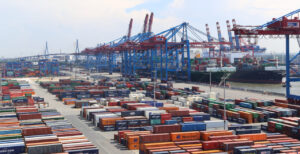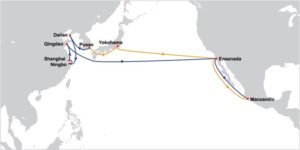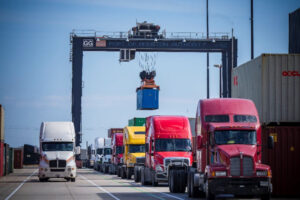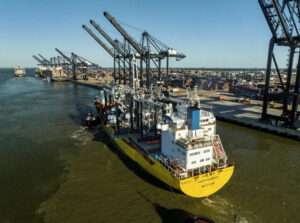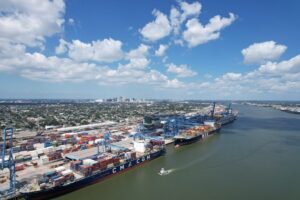Despite outcry from a number of international bodies, the Federal Maritime Commission (FMC) has announced that it has given the green light to the P3 alliance.
The news may come as something of a disappointment to the Global Shippers Forum (GSF) who, as early as November 2013, made note of the possible implications that the formation of such an alliance could have on the rest of the shipping world.
The P3 alliance; a massive shipping union between A.P. Moller-Maersk, CMA CGM S.A. and MSC Mediterranean Shipping Company S.A. would result in granting three of the largest shipping carriers to jointly operate trade routes between the US and Asia, Northern Europe and the Mediterranean.
During their third annual meeting, members of GSF urged a number of international shipping bodies, including the FMC, European Commission, and Chinese regulators to re-evaluate the effects such an alliance could have.
The fear is that P3 could greatly affect prices, services and service quality globally.
GSF Secretary General, Chris Welsh voiced these fears during the meeting, stating that such an alliance could eliminate any offers for smaller operators in the area and “fundamentally change the structure of container shipping markets.”
“The major fear is the market impact that the P3 Agreement would have. If P3 were to proceed in its current form, the structure of container shipping markets serving EU and global trades would be fundamentally changed, including the possibility of eliminating effective competition.”
Similar fears have been issued globally; earlier in the month the Korean Shipowners Association announced that they would be teaming up with the Chinese Shipowners Association to protest the development of the new super-carrier.
However, despite these fears, the FMC has allowed the alliance to continue plans to begin operations later in the year.
The commission decided that as of the immediate future, it is not likely that the agreement will “produce an unreasonable increase in transportation cost or unreasonable reduction in transportation services.”
However, they do accept the possibility that such an issue could occur in the future.
Therefore, the body has decided to issue alternative reporting requirements to members of the agreement, keeping a close eye on any possible changes in the marketplace and ensuring P3 doesn’t force anyone out.
Whilst not the result the GSF wanted, they praised the FMC for their efforts, and welcomed “the fact that the FMC is to implement alternative reporting requirements”.
Nevertheless, attention now turns to Brussels where the European Commission will examine a recently submitted legal brief provided by GSF, which hopes to re-examine the legality of P3, specifically in regards to the EU’s guidelines on competition and the knock-on affects that could result from the P3 agreement.
The Game has changed
Already, ripples of apprehension can be felt within the shipping community, and with them, attempts to adapt and prevent the development of an almost one-sided market.
Several other large-scale carriers are now following suit, in hopes of developing alliances of their own.
This includes the G6: A consortium consisting of Hapag-Lloyd, OOCL, NYK, APL, Hyundai Merchant Marine and MOL, with hopes to compete with the P3 network.
G6 plan to expand operations to service up to 12 container trade services with a fleet of 76 vessels between Asia and the US, whilst operating an additional 42 ships across five transatlantic loops servicing the US eastern and western coasts, Canada, Panama, Mexico and northern Europe.
Outside of this, Hapag-Lloyd has announced that discussions are being held with CSAV in the hopes of a merger or some sort of partnership in the near future.
Yang Ming, United Arab Shipping Company (UASC) and China Shipping Container Liner (CSCL) are also planning to unify operations in Asia-North American trade routes.
If alliances like these are allowed to happen, it leads many to question what is next for the industry.
Already, we are seeing an over-saturated market place developing. With financial reports from 2013 now being released, a clear image is painted – a year where supply has begun to exceeded demand.
This may have much to do with the influx of new ‘Mega’ class new builds being delivered and beginning operations worldwide, some carrying up to a staggering 18,000 TEU.
However, in order to prevent over-saturation, there comes the need to dilute fleet operations into over routes.
Orient Overseas Container Line (OOCL) was one of the many to experience this need.
Chairman of OOIL, OOCLs parent company, Mr. C C Tung noted this in an official statement: “deployment of the largest newbuilds to the Asia-Europe trade triggered cascading into the Trans-Pacific trade, which in turn displaced a considerable number of mid sized ships to other trade lanes.
“This cascading effect brought considerable excess capacity to the Intra-Asia and Australasia trades as well as the Trans-Pacific trade, and added volatility to the market.”
With oversaturation already happening in the market place, the inclusion of these new partnerships, and the increased financial infrastructure that comes with them, can only result in the following: Exponential growth in all shipping routes as larger vessels cascade into alternative ones to cope with the over-saturation.
As such, the industry is going to have to do the same. This much is clear with new dredging operations being announced every day. Even the Panama Canal has undergone significant works in order to accommodate with this explosive growth.
Despite the GSF fears, the likelihood that the P3 Alliance will go ahead is becoming more and more a reality, and with it, a new industry would be born: one where companies must adapt and grow or be left behind.

